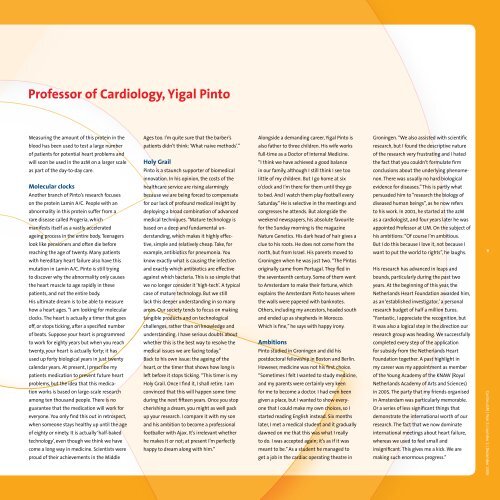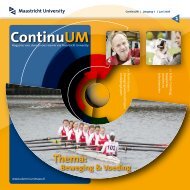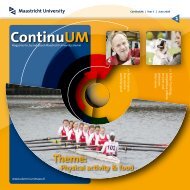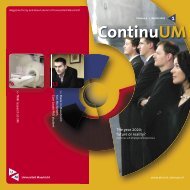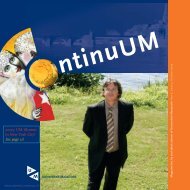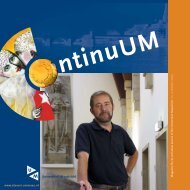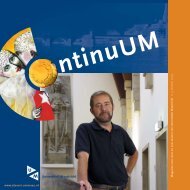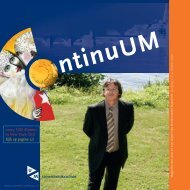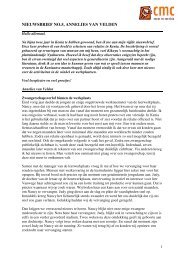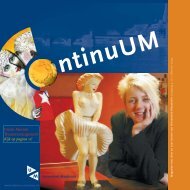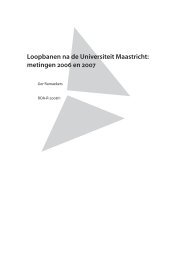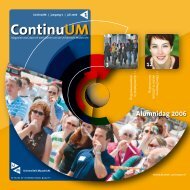Welcome new alumni! - Maastricht University
Welcome new alumni! - Maastricht University
Welcome new alumni! - Maastricht University
Create successful ePaper yourself
Turn your PDF publications into a flip-book with our unique Google optimized e-Paper software.
Professor of Cardiology, Yigal PintoMeasuring the amount of this protein in theAges too. I’m quite sure that the barber’sAlongside a demanding career, Yigal Pinto isGroningen. “We also assisted with scientificblood has been used to test a large numberpatients didn’t think: ‘What naive methods’.”also father to three children. His wife worksresearch, but I found the descriptive natureof patients for potential heart problems andwill soon be used in the azM on a larger scaleHoly Grailfull-time as a Doctor of Internal Medicine.“I think we have achieved a good balanceof the research very frustrating and I hatedthe fact that you couldn’t formulate firmas part of the day-to-day care.Pinto is a staunch supporter of biomedicalin our family, although I still think I see tooconclusions about the underlying phenome-Molecular clocksinnovation. In his opinion, the costs of thehealthcare service are rising alarminglylittle of my children. But I go home at sixo’clock and I’m there for them until they gonon. There was usually no hard biologicalevidence for diseases.” This is partly whatAnother branch of Pinto’s research focusesbecause we are being forced to compensateto bed. And I watch them play football everypersuaded him to “research the biology ofon the protein Lamin A/C. People with anfor our lack of profound medical insight bySaturday.” He is selective in the meetings anddiseased human beings”, as he now refersabnormality in this protein suffer from adeploying a broad combination of advancedcongresses he attends. But alongside theto his work. In 2001, he started at the azMrare disease called Progeria, whichmedical techniques. “Mature technology isweekend <strong>new</strong>spapers, his absolute favouriteas a cardiologist, and four years later he wasmanifests itself as a vastly acceleratedbased on a deep and fundamental un-for the Sunday morning is the magazineappointed Professor at UM. On the subject ofageing process in the entire body. Teenagersderstanding, which makes it highly effec-Nature Genetics. His dark head of hair gives ahis ambitions: “Of course I’m ambitious.look like pensioners and often die beforereaching the age of twenty. Many patientstive, simple and relatively cheap. Take, forexample, antibiotics for pneumonia. Youclue to his roots. He does not come from thenorth, but from Israel. His parents moved toBut I do this because I love it, not because Iwant to put the world to rights”, he laughs.with hereditary heart failure also have thisknow exactly what is causing the infectionGroningen when he was just two. “The Pintosmutation in Lamin A/C. Pinto is still tryingand exactly which antibiotics are effectiveoriginally came from Portugal. They fled inHis research has advanced in leaps andto discover why the abnormality only causesagainst which bacteria. This is so simple thatthe seventeenth century. Some of them wentbounds, particularly during the past twothe heart muscle to age rapidly in thesewe no longer consider it ‘high-tech’. A typicalto Amsterdam to make their fortune, whichyears. At the beginning of this year, thepatients, and not the entire body.case of mature technology. But we stillexplains the Amsterdam Pinto houses whereNetherlands Heart Foundation awarded him,His ultimate dream is to be able to measurelack this deeper understanding in so manythe walls were papered with banknotes.as an ‘established investigator,’ a personalhow a heart ages. “I am looking for molecularareas. Our society tends to focus on makingOthers, including my ancestors, headed southresearch budget of half a million Euros.clocks. The heart is actually a timer that goestangible products and on technologicaland ended up as shepherds in Morocco.“Fantastic, I appreciate the recognition, butoff, or stops ticking, after a specified numberchallenges, rather than on knowledge andWhich is fine,” he says with happy irony.it was also a logical step in the direction ourof beats. Suppose your heart is programmedto work for eighty years but when you reachunderstanding. I have serious doubts aboutwhether this is the best way to resolve theAmbitionsresearch group was heading. We successfullycompleted every step of the applicationtwenty, your heart is actually forty; it hasmedical issues we are facing today.”Pinto studied in Groningen and did hisfor subsidy from the Netherlands Heartused up forty biological years in just twentyBack to his own issue: the ageing of thepostdoctoral fellowship in Boston and Berlin.Foundation together. A past highlight incalendar years. At present, I prescribe myheart, or the timer that shows how long isHowever, medicine was not his first choice.my career was my appointment as memberpatients medication to prevent future heartleft before it stops ticking. “This timer is my“Sometimes I felt I wanted to study medicine,of the Young Academy of the KNAW (Royalproblems, but the idea that this medica-Holy Grail. Once I find it, I shall retire. I amand my parents were certainly very keenNetherlands Academy of Arts and Sciences)tion works is based on large-scale researchamong ten thousand people. There is noguarantee that the medication will work foreveryone. You only find this out in retrospect,when someone stays healthy up until the ageof eighty or ninety. It is actually ‘half-bakedtechnology’, even though we think we havecome a long way in medicine. Scientists wereproud of their achievements in the Middleconvinced that this will happen some timeduring the next fifteen years. Once you stopcherishing a dream, you might as well packup your research. I compare it with my sonand his ambition to become a professionalfootballer with Ajax. It’s irrelevant whetherhe makes it or not; at present I’m perfectlyhappy to dream along with him.”for me to become a doctor. I had even beengiven a place, but I wanted to show everyonethat I could make my own choices, so Istarted reading English instead. Six monthslater, I met a medical student and it graduallydawned on me that this was what I reallyto do. I was accepted again; it’s as if it wasmeant to be.” As a student he managed toget a job in the cardiac operating theatre inin 2005. The party that my friends organisedin Amsterdam was particularly memorable.Or a series of less significant things thatdemonstrate the international worth of ourresearch. The fact that we now dominateinternational meetings about heart failure,whereas we used to feel small andinsignificant. This gives me a kick. We aremaking such enormous progress.”ContinuUM | Year 5 | number 2 | December 2006


